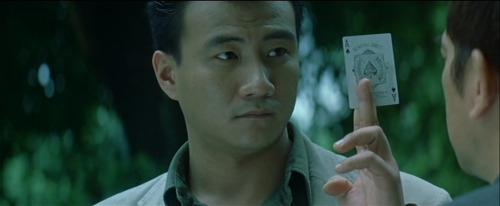31st March
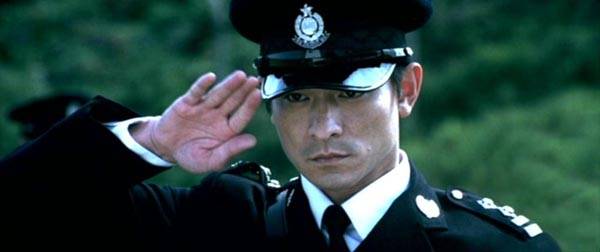
Infernal Affairs
Ho boy. Here we go. The bashing of the original.
Just kidding. It wasn't that bad. But still, the practice of seeing the remake before the original can really switch up your ordinary "original is better than remake" perspective, because damn,
Infernal Affairs sure made
The Departed look like Citizen F-ing Kane.

I'll admit, I've always had little respect for Chinese movies, despite being a Chinese and an Asian myself. Most of the ones I grew up with just didn't impress me with their low-concept plot, and a lot of them were mindless action films focusing on badass characters, their storyline as interesting as as Jackie Chan or even Steven Seagal movies. That's not to say all Chinese movies are like that (not that I've had the fortune to be blessed with the viewing of amazing Chinese movies), nor am I saying that
Infernal Affairs is outright terrible... but damn, did it ever come close! xD
Jokes aside (and I was really just joking; it's not that bad), there are a number of flaws that Scorsese brilliantly fixed in his remake. The tension of two cops hunting each other was fantastically done in
The Departed, while in
Infernal Affairs, there seems to be an obsession to pace everything so slowly like it's supposed to be a character study... only that the characters aren't that interesting, especially Billy- oh, sorry, I mean Chan Wing-yan, the undercover cop.
Chan was played as such a straight, average guy that it was rather boring to watch him. He's a mole in the mafia, but he keeps such a cool and calm demeanor with him the whole time that it absolutely makes no sense in contrast to Leo's portrayal, where a desperate man is fearing for his life. So by the end of the movie, when he desperately wanted his identity back - I don't give a s***! You didn't convince me that you were fearing for your life. Why the hell should I care now?
Andy Lau. You know, Pretty-Face here definitely is more suited for singing than acting. Though it might be largely due to my lack of experience in Chinese movies, I've rarely seen Andy Lau in a good role! At least Matt Damon has a great reputation in acting, not to mention his performance in the Bourne franchise. Most of what I've heard Andy Lau from the Chinese community is his singing career. It helps that Lau Kin-ming (coincidentally sharing the last name of the actor, or should I say lazily) is supposed to be a blend character from the start, which was why Damon's type-casting works. But at least Matt was somewhat entertaining! Andy just acts like every music video I've seen him in - stone-faced and boring as f***!
And no, I'm not done!
Eric Tsang, great man, fun actor to watch. I've always had a personal bias for Eric, for he just has a kind of charm that wins me over. But here... I think that charm's a little underused. He's slightly less dead-eyed than the rest of the cast, and that's not saying much. And honestly, some aspects of his goofy persona outside of acting could be seen here in his character. Whereas Nicholson inadvertently brought his eccentricities to work, Eric brought his goofiness. Not that I could say I hate him for it - I love him, even if I can't bring myself to say that it's suitable for his character.
Going back to the overall pacing of the script, this movie just feels awkward in many parts. The three different love interests being combined into one was one of the best ideas Scorsese ever had. The way it's played out here, it's so ridiculous. Not only Chan's love interest (Lee Sum-yi) spontaneously falling in love with him all of the sudden without prior foreshadowing or anything, we never got enough time to care about the other two love interests at all. Seriously, what's with Hong Kong movies with their spontaneous love interests? Is that how relationships work in Hong Kong? Because this is not the first time I've seen something like that.
It's not all bad, of course, as the film did a few things much better than the remake, such as Superintendent Wong Chi-shing being the only one who knows of Chan's identity instead of having two separate cops. This work well because Chan and Wong are able to have a tighter relationship together in the story, their bond closer, without some Marky Schmuck injecting clever insults and interrupt the moment. That was... until the corny death music came around and spoil what could have been an emotional moment. Seriously, why do people have to insert stupid music in the background when someone dies? You underestimating our emotional capabilities, is that it? The scene worked so much better in
The Departed with the silence. You could feel the shock from seeing Leo's surprised expression being reflected on your own face without some over-the-top Church hymn. If only they could combine that scene with the bond Chan and Wong had, because I didn't really feel the chemistry between Queenan and Billy.
Also, the Morse Code was pretty clever, much more than whatever Scorsese tried to do with the same scene. The fact that the same Morse Code element was incorporated in a later scene instead of being a Chekhov's plot-device was even better. I have to admit though that I was a bit annoyed how Hon Sam, the triad boss, didn't pay more attention to Chan sending Morse Codes despite LAU TELLING HIM THAT THE MOLE USED FREAKING MORSE CODE! Oh my god. lol
And really, I can't stress enough the point of
The Departed being one adrenaline-pumping thriller whereas
Infernal Affairs was a slower drama movie. Leo and Damon really brought the contrasting parallels in their characters, who could not be more different and yet are two sides of the same coin. It was fun to watch how their separate fates unfold. Having said that, the original actually has pretty intelligent themes amidst the drama. Yes, intelligent, much more than the more action-packed
The Departed, I'm afraid. Sorry, Scorsese.
While it is true that the exciting story of two cops hunting down one another was better executed in the remake, I can't dismiss the underlying philosophies brought about by the original movie. See, at the very beginning of the movie, the film goes on a textual narrative (what's with Hong Kong movies and asking the audience to read stuff like it's a book?) about the various layers of Hell, and how the worst one was called "Continuous Hell", where one suffers for all eternity the sins he have committed. Even the Mandarin title played on this theme, with "Wu Jian" meaning "Continuous" while the "Dao", the third Chinese character, meaning "Road". One thing that has always bothered fans of the original was how the remake had a clean-cut happy ending, and I couldn't agree more. Lau in the original is forced to walk the "Road of Continuous Hell", facing up to all the sins he has committed, and we are left with a depressing scene where Lau confesses that he would switch place with the now dead Chan. It is absolutely beautiful.
Unfortunately, that only came at the end of what is a mess of a movie. Huh. So are the two sequels going to be any better? Or will I be treading on two 'continuous hell' of movie experiences? lol
Oh, there is one thing I must absolutely point out - I love how Lau's character was written much more than Sullivan, despite not sharing the sentiment in regards to their portrayal. Lau's display of his desire towards becoming a better cop, a better person, is just the kind of foreshadowing/exposition we need to further the theme of suffering an eternal Hell for one's sins. While the remake cut this out due to an understandable difference in the American culture, I just didn't really like Sullivan as much as Lau - he's a selfish dick, while Lau is merely a fool.

 I had thought that it was supposed to be in Superman II or one of the later movies.
I had thought that it was supposed to be in Superman II or one of the later movies.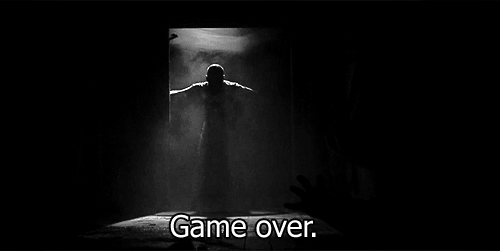

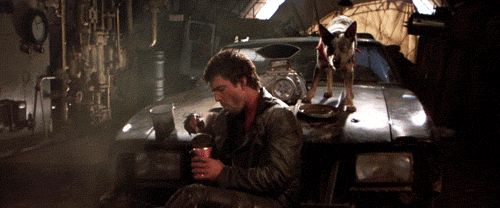
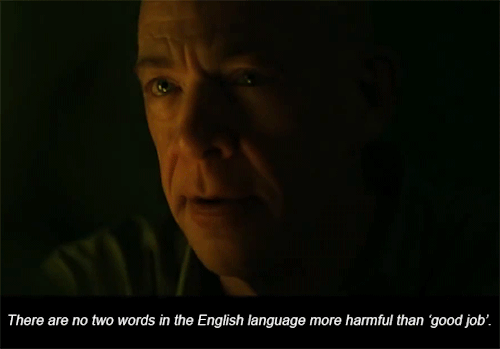

 ). Keep posting.
). Keep posting. 



